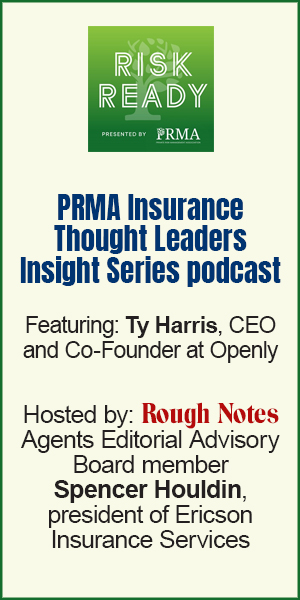Show your clients that you’re
more than just another transactional agent
[E]mpathy isn’t just a “nice-to-have”—it’s essential. In a
world full of empty noise, being genuinely human is your superpower.
By Carolyn Smith, APR, TRA
Consumers today are skeptical, maybe more than they’ve ever been. They’re bombarded with lies, deepfake AI images and videos, cyber breaches and compromised personal data, and a constant stream of distorted news. Trust is at rock bottom, and who could blame them? And let’s not sugarcoat it—the insurance industry is feeling the heat, too. After all, when premiums spike and coverage terms change without comprehensible reasons, trust takes another hit.
People today are craving honesty and someone on whom they can rely. They’ve lost faith in ads, influencers, and those faceless corporations that just want to sell them something and grab their data. And let’s be real—they’re not too fond of agents either, especially after seeing those insurance bills shoot up. That’s the landscape you’re navigating.
So, what does that mean for you as an insurance and risk management advisor? It means you’ve got to cut through the noise. You need to be the one who’s real, genuine, and trustworthy. But how do you do that?
Here’s the secret: It’s all about how you make people feel. When clients talk to you, do they feel heard? Do they feel understood? Do they feel like you’re on their side, not just trying to close a deal?
This is where empathy comes into play. And no, I’m not talking about being all mushy or overly sentimental. It’s about understanding that your clients are real people with real worries, concerns, and needs. They don’t want to be another number in your CRM—they want to feel like you genuinely care about their well-being.
Here’s the bottom line: In a world where trust is hard to come by you need to stand out by being authentic. Show them that you’re not just another face in the crowd—you’re a real person who gets their pain points, who’s ready to help them navigate the confusing world of insurance, and who’s there to back them up when things get tough.
In other words, empathy isn’t just a “nice-to-have”—it’s essential. In a world full of empty noise, being genuinely human is your superpower. It’s what makes clients stick around when everyone else is just shouting into the void.
Empathy and authenticity
So, you may be wondering, how does empathy play out in today’s digital world, where everything is fast, automated, and a little impersonal? After all, consumers aren’t looking for a talking head or a faceless algorithm when they’re dealing with their most valuable assets or navigating a claim. They want to know that there’s a real person on the other end who gets it—someone who understands their fears, their hopes, and their needs. You must show up, be real and empathetic, and build those connections that no chatbot ever could.
As insurance and risk management interactions grow increasingly virtual and impersonal, empathy and authenticity are more crucial than ever for building meaningful connections. Personalizing these interactions is essential; people—business owners, heads of household, decision-makers—want to feel understood and valued, especially when discussing their most significant concerns. Tailoring conversations to their unique needs and situations build rapport and trust, making them feel like more than just another policy number.
Dave Berndt, futurist and vice president of human relations at Nottingham Insurance in New Jersey, says, “To keep up with other industries like Amazon, insurance agencies need to focus on granular personalized interactions with clients. By using tools like CRM software, AI, and data analytics, we can understand our clients better and offer solutions that meet their needs. These kinds of interactions help build loyalty and trust, which are essential in the insurance industry because strong, long-term relationships are key to success for both the agency and the client.”
In other words, use automation, use AI—but use them to enhance, not replace, the human touch. When everyone else is relying on algorithms to do the heavy lifting, you can win by being the agent who listens, who shows empathy, and who makes clients feel like they’re more than just another transaction.
Your digital channels? Make sure they don’t sound robotic. Your emails, your website, even your chatbots should all reflect your authentic voice, one that understands and empathizes with the client’s situation. It’s not just about being efficient; it’s about being real.
“By equipping our employees with advanced AI tools, we can give them back their time to focus on their true core responsibilities.
“By reducing manual touch with the mundane tasks like data entry and spreadsheeting, we can have those same employees instead focus on relationship building like in-person visits or value-adding consultative conversations. Essentially, non-human technologies will allow us to increase our humanity,” explains Joseph Hughes, marketing and operations specialist at Flatlands Jessup Insurance Group in North Carolina.
How does social media fit into a humanizing strategy?
Building trust on LinkedIn
Building a community on LinkedIn is about being real and creating trust even before people get to know you personally. Networking shouldn’t just be another task on your prospecting checklist; it’s a foundational element of success. Yet, navigating it effectively—especially in the digital landscape—can be challenging.
LinkedIn offers immense potential for networking, but it’s not about bombarding your network with pitches or self-promotion. It’s about showing who you are—your human side—to your community.

The true power of networking lies in forging genuine relationships with the real you. It’s about delivering value, engaging with intention, and being your authentic self. That’s the key to turning connections into meaningful opportunities.
For example, Andy Neary, founder of Complete Game Consulting, has a down-to-earth vibe that comes through in every conversation, whether you’re meeting him in person or catching him online. A former Major League Baseball player, Andy keeps it real—no ego, no fluff—just a grounded, genuine approach that makes him relatable despite his past in the big leagues. His focus? Helping others win by leveraging social media to build a community with long-lasting relationships.
During a recent Beyond Insurance Global Network (BIGN) Business Development Academy class, Neary said, “Social media allows you to build a relationship with prospects that lets you get to know them and vice versa. Essentially, your goal is to build a relationship strong enough so, when they’re ready to talk to other advisors, you are at the top of the list. When you produce social media content your prospects find valuable and allows them to get to know you, you will start building a relationship with them long before you meet them. I can’t tell you how many times I’ve had advisors tell me, ‘I feel like I already know you!’ the first time they jump on a Zoom call with me.”
Storytelling on LinkedIn
Storytelling captivates others by drawing them into a narrative that resonates with their own experiences and emotions. It transforms a simple LinkedIn post into a shared journey, making prospects, clients, centers of influence, and even underwriters feel seen, heard, and understood. By weaving stories that highlight challenges, solutions, and successes, you invite your audience to envision themselves as part of the story, creating a powerful emotional connection that goes beyond the transaction and fosters lasting relationships.
Chloe McClimon, a benefits advisor with Kingsgate Insurance, takes a page from Andy Neary’s playbook on LinkedIn community building to share her story in a way that truly connects. She opens up about her journey as a benefits broker in Iowa, focusing on healthcare plans and benefits optimization, giving her audience a clear picture of her professional expertise. But she doesn’t stop there—Chloe brings her personal side into the mix, sharing a fun tidbit about her adventures from camping trips with her boyfriend to eventually tying the knot. By posting pictures of those memorable moments—camping under the stars and walking down the aisle—she invites her audience into her world, creating a sense of connection and community. This approach makes her network not just followers, but participants in her story.
Gaining trust in a non-trusting world
Bottom line, in a world where no one knows what to believe, your clients need someone they can trust. That someone is you. By humanizing your interactions, showing genuine empathy, sharing your authentic story, and being a voice of honesty and integrity, you’re not just another transactional insurance agent—you’re a trusted advisor.
This is what will make clients choose you over the competition. It’s what will make them stay. And in a market that’s more skeptical than ever, that’s how you win.

The author
Carolyn Smith, APR, TRA, chief training officer for Beyond Insurance, creates and delivers transformative programs, including the Trusted Risk Advisor certification, BIGN Producer Boot Camp, and Quest for Success, that have positively impacted the lives and careers of countless professionals. These programs help industry professionals build a career that they love and achieve the success they deserve.





